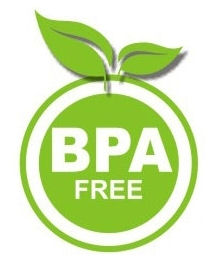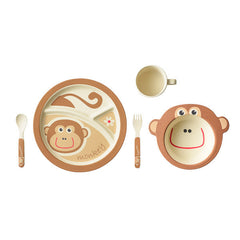- Continue Shopping
- Your Cart is Empty
There's Another Toxin in Plastic You Need to Know About
In recent years, public health officials have done a good job educating consumers about the dangerous of bisphenol A or BPA. Many manufacturers of plastic products have stopped using BPA in their products due to concerns that the substance can cause a number of health problems, including asthma, heart disease, infertility, cancer and development disorders in children. Now, a study has concluded that one of the plastic additives being used as a replacement for BPA may be just as dangerous.
The study in question was published in the journal Endocrinology and examines the effects of a substance called Bisphenol S or BPS. BPS is one of the most commonly used alternatives for BPA. During the study, the scientists exposed the embryos of zebrafish to BPS and BPA and observed what happened to them. The brain cells of the creatures exposed to both chemicals underwent similar transformations, and there were disruptions in the genome that would impact reproduction.
Based on the scientific evidence, the researchers concluded that BPS causes harmful affects to the endocrine system just like BPA. While more research is needed to validate their findings, it does point to the fact that not all BPA-free plastics are safe alternatives to the toxic plastic.
Public health experts have spoken out since the release of the journal article urging people to be choosy about the plastic that they use and to find out if BPS is used in place of BPA. The experts also recommend using other types of materials when possible, such as silicone baby bottles like the ones sold by ThinkBaby or bamboo dinnerware.
You can find a number of types of alternative dinnerware for purchase in our tableware department here at Paperless Kitchen.
4 Steps to a Chemical Free Thanksgiving

This Thanksgiving, you want to fill yourself up with turkey and all of the trimmings, but you don't want to overload yourself on chemicals. Unfortunately, many of the things we traditionally eat on Thanksgiving can be tainted with chemicals of all types. By following these simple tips, you can decrease your family's exposure to various toxins this Thanksgiving.
1. Be choosy about your bird. - While in the U.S., it's illegal for turkey to contain hormones, you can still find some unwanted ingredients in your turkey, particularly ones that are labeled as 'self-basting.' To get the best bird, choose one purchased fresh from a farm or one labeled with organic certification from the USDA.
2. Ditch the cans. The lining in tin cans often contains BPA, a known toxin. By choosing fresh fruits and veggies in place of canned fare, you'll also spare yourself a lot of sodium.
3. Go organic for your mash. - Make sure your mashed potatoes are organic! Potatoes are one of the veggies that the Environmental Working Group has identified as having high rates of pesticide contaminants. The celery for your stuffing and the zucchini, spinach and collard greens for your Thanksgiving sides are on there, too, so plan accordingly!
4. Pick the right plastic. When you're cooking, serving or eating dinner, only use plastic dinnerware, utensils and tools that are free of BPA.
5. Eat it cleaner. Before you use any fruits and vegetables in your Thanksgiving recipes, give them a wipe down with Eat Cleaner Wipes to remove residues from chemicals as well as germs and dirt.

BPA Linked to Miscarriages
In a previous blog post, we have discussed governmental pushes to reduce or eliminate BPA in consumer products. Now, a new study conducted by the Stanford University Medical Center indicates that BPA can be harmful not only to developing babies but also to fetuses.
The study examined two sets of blood samples from 114 pregnant women, comparing the levels of BPA from the first set to a set taken either after a woman miscarried or gave birth. The women who had the highest levels of BPA in their samples were at 80 percent increased risk for having a miscarriage when compared to those who had the lowest levels.
While this is a relatively small study and more research is needed to know for sure if BPA contributes to miscarriages, the study does suggest that pregnant women may be wise to limit their exposure to BPA by avoiding plastics made with the additive and metal products that are lined with it.

Paperless Kitchen Tested: thinkBaby BPA Free Kids Cup
As a part of introducing our Back to School collection on Paperless Kitchen, I've spent some time investigating some of our newer products. First up is the thinkBaby BPA Free Kids Cup.

The Basics
The thinkBaby BPA Free Kids Cup is a BPA-free drinking cup intended for children. It is outfitted with a removable stainless steel liner and has an orange plastic exterior with a handle. The cup holds about 9 ounces of fluid. When I first opened the package, I was struck by how heavy the cup is. You can tell that it's really solidly crafted. It doesn't have that chinsy, flimsy feeling in the handle that you find in a lot of plastic cups.
The Drink
Since I know of only one way to test a cup, I filled it up with some coffee. Even though the cup doesn't have a lid, I felt like my drink stayed a lot hotter than it did in an ordinary coffee cup. The cup also didn't feel hot to the touch, so it was easy to drink from. I was worried that the liner would move when I sipped because it lifts out really easily, but I was pleasantly surprised. It didn't move at all.
The Wash
I decided to give the cup a wash up in the sink and wash it in the dishwasher for my road test. It was really easy to clean both ways and looked good as new after washing it in the bottom rack of the dishwasher.
The Takeaway
I know this cup is for kids, but I intend to keep using it. It just says "Think" on the front, so I think I can get away with it. Even if I can't, it's too good of a cup to care.
Introducing...Fit & Fresh
As a part of our Back to School department, we've added some new brands to the Paperless Kitchen family. One such brand is Fit & Fresh, a company committed to limiting our exposure to the harmful toxin BPA.
We've added a few different Fit & Fresh products to our collection, including:
- Fit & Fresh Kids 1 Cup Chill Container - This plastic bag alternative has a built-in icepack to keep lunches cool.

- Fit and Fresh Kids Hot Lunch Container - Your kids will get a hot lunch without eating cafeteria food when you bring home this container. It even has a lower compartment for storing crackers for soup.

Be sure to check out these green lunchtime solutions and let us know what you think!
Are You Concerned About BPA? New Research Suggests You Should Be.
Even though the controversy over the chemical additive isn't new by any means, BPA is still frequently in the news. Just this week, North Carolina State University released a summary of the results of a study on the harmful effects of BPA. The study confirms what numerous others have found--that exposure to bisphenol A or BPA early in life can lead to changes in gene expression. These changes have been linked to anxiety disorders in men and women and impaired prostate function in men.
It's studies like these that are the cause behind the push to have BPA banned in many parts of the world. Earlier this week, an environmental group testified in a hearing at the Maine State Chamber as the discussion over a bill to prohibit the sale of plastic products that contain BPA continues. Complete and partial bans of BPA are already in place in more than 10 states.
The U.S. Food and Drug Administration has banned the use of BPA in baby bottles, but many polycarbonate plastic products still contain the chemical. Many of these products have the number 7 recycling symbol printed on them, but others do not. Since it can be difficult to tell which items in your cupboard contain BPA, the best way to protect your children from the additive is to switch to sustainable, plastic alternatives, such as bamboo drinkware, plates and silverware. BPA is often used to line aluminum cans, too, so limiting your use of canned foods and drinks can also help protect your kids from the chemical.
Paperless Kitchen wants to know, "Are you concerned about BPA? What steps have you taken to eliminate it in your home?"








